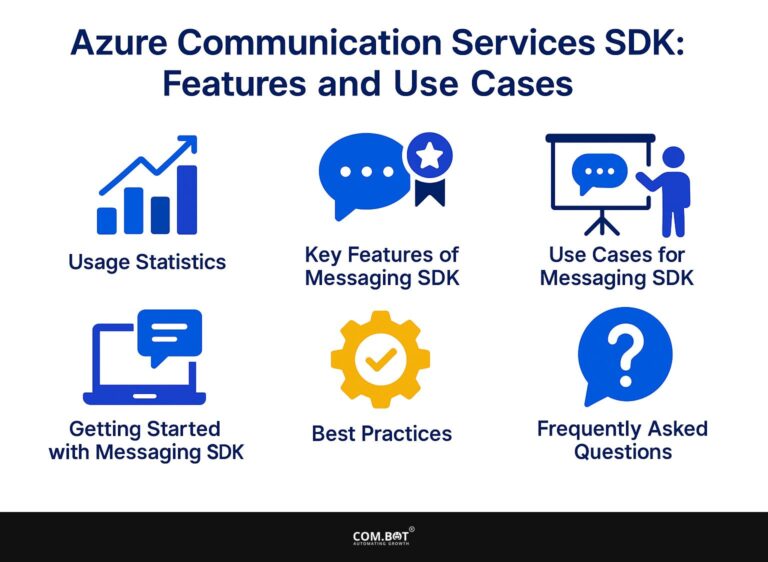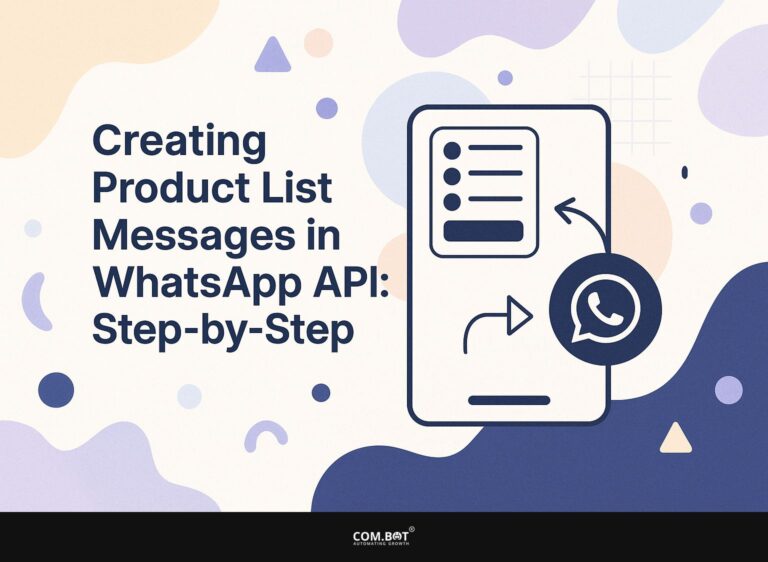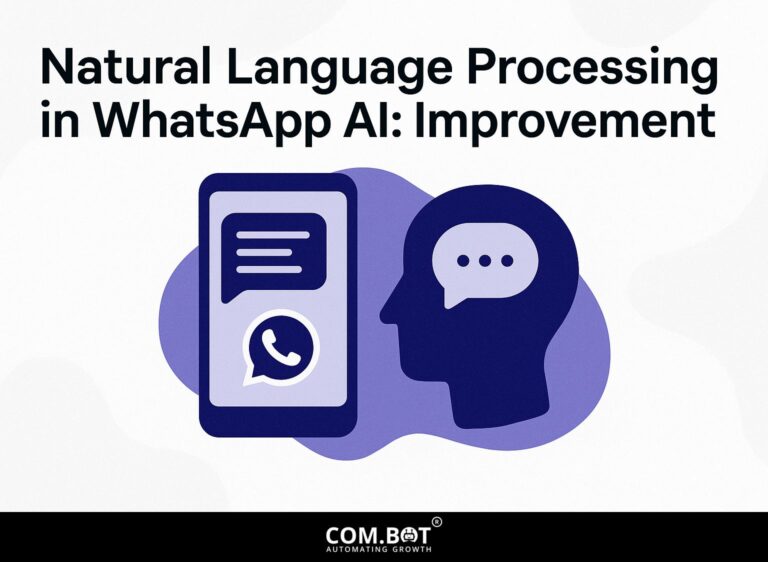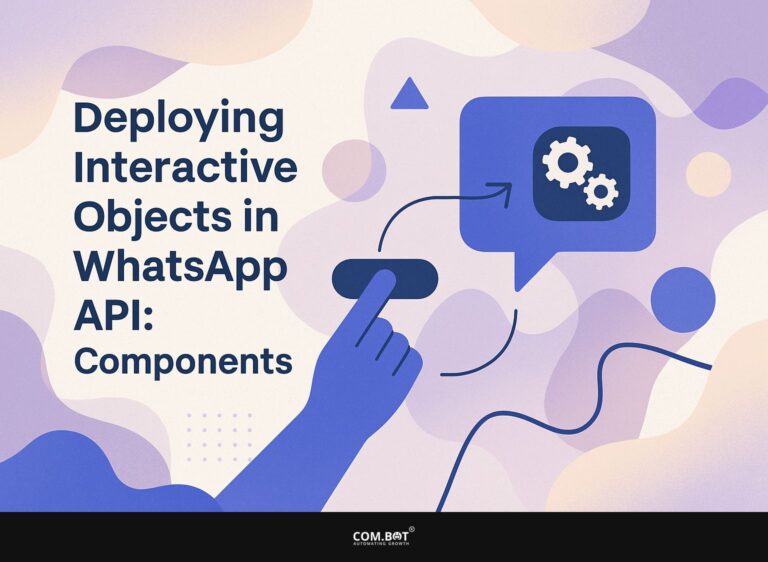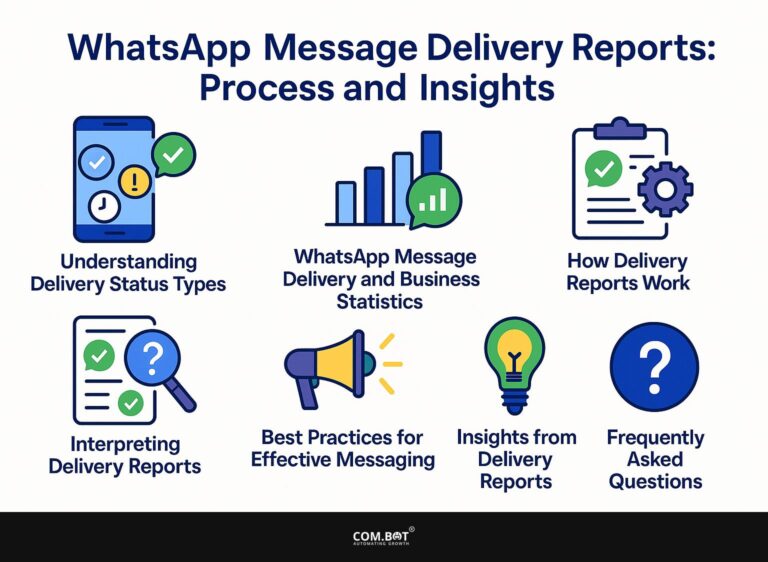WhatsApp AI Chatbots: Popularity and How They Work
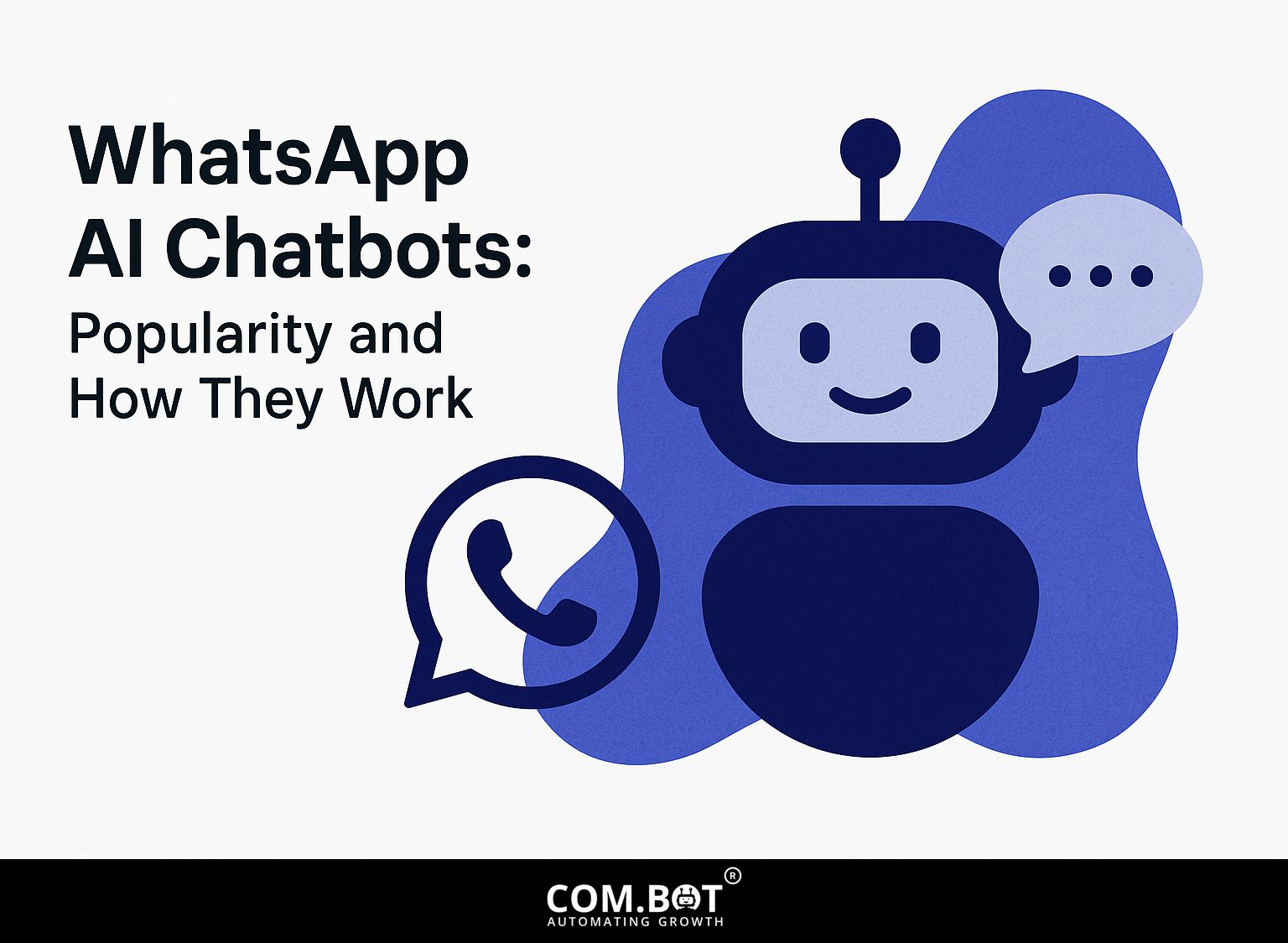
As WhatsApp develops, AI chatbots are becoming more important, changing how users and businesses interact. With advancements from Meta and tools like ChatGPT, these chatbots use the latest technology to offer seamless conversations. In this article, we’ll look at why WhatsApp AI chatbots are becoming more popular, how they work, and the benefits they offer to consumers and businesses. Discover how WhatsApp is changing communication and customer service.
Key Takeaways:
- WhatsApp AI chatbots are gaining popularity due to their ability to provide 24/7 customer support and cost-effectiveness.
- These chatbots work through natural language processing (NLP) and machine learning algorithms to understand and respond to user messages.
- Although WhatsApp AI chatbots offer advantages, they also encounter issues like privacy worries and technical restrictions. However, upcoming trends suggest they might work well with other technologies and provide a better experience for users.
- 1 WhatsApp Business and Chatbot Usage Stats for 2025
- 2 Popularity of WhatsApp Chatbots
- 3 How WhatsApp AI Chatbots Work
- 4 Benefits of Using WhatsApp AI Chatbots
- 5 Challenges and Limitations
- 6 Future Trends in WhatsApp AI Chatbots
- 7 Frequently Asked Questions
- 7.1 1. What are WhatsApp AI chatbots and how do they work?
- 7.2 2. Why are WhatsApp AI chatbots becoming popular?
- 7.3 3. What types of tasks can WhatsApp AI chatbots perform?
- 7.4 4. Do WhatsApp AI chatbots have limitations?
- 7.5 5. Can I create my own WhatsApp AI chatbot?
- 7.6 6. Are WhatsApp AI chatbots safe to use?
1. Definition and Purpose
WhatsApp AI chatbots are messaging tools that automatically handle questions and tasks, enhancing user interaction and streamlining operations.
These chatbots can improve customer service by giving quick answers to common questions, helping users with tasks, and even handling transactions.
For example, companies can use tools like Twilio for easy setup, or Chatbot.com to create chat flows without needing to code.
By using analytics features, businesses can track user interactions and improve responses over time. Make the experience special by using customer information to customize messages, keeping interest high and making users feel important.
2. Growth of Chatbot Technology
The market for chatbot technology is predicted to grow from $2.6 billion in 2020 to over $9.4 billion by 2024, indicating a significant increase in automated customer conversations.
This growth is fueled by advancements in natural language processing (NLP) and machine learning, enabling chatbots to understand and respond to human queries with increasing accuracy.
For example, businesses are using chatbots such as Drift and Intercom to improve customer interaction. Studies indicate that more than 67% of consumers like chatting with chatbots for fast responses.
Using AI-powered tools helps create customized interactions with customers, greatly improving satisfaction and cutting down response times. Learn more about how AI bots enhance customer support and boost satisfaction.
WhatsApp Business and Chatbot Usage Stats for 2025
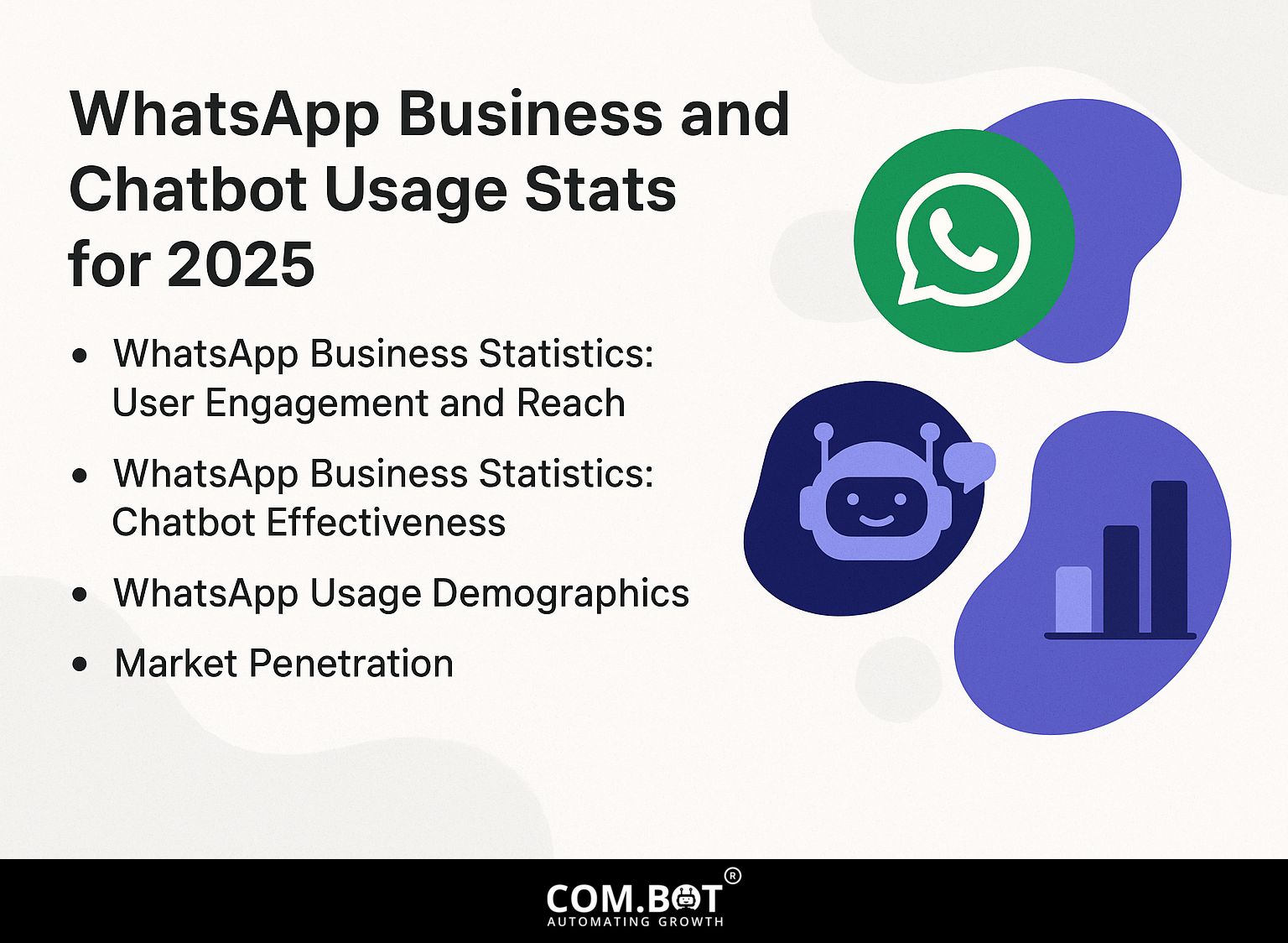
WhatsApp Business Statistics: User Engagement and Reach
WhatsApp Business Statistics: Chatbot Effectiveness
WhatsApp Business Statistics: WhatsApp Usage Demographics
WhatsApp Business Statistics: Market Penetration
The WhatsApp Business and Chatbot Usage Stats for 2025 Give a detailed look at how more businesses are using WhatsApp, focusing on its widespread use, chatbot success, user groups, and how deeply it has entered the market. This data highlights the platform’s importance in worldwide communication and methods for connecting with customers.
In terms of User Engagement and Reach, 90% of messages are successfully delivered through WhatsApp campaigns, signaling its reliability and effective communication channel for businesses. With 1.26 billion users employing WhatsApp Business features from the total 2.78 billion users worldwide, the service is a cornerstone in digital marketing, facilitating direct and personal interaction between businesses and consumers.
- Chatbot Effectiveness: WhatsApp chatbots have saved 2.5 billion hours, demonstrating efficiency in automating customer interactions. Furthermore, 54% of users opt-in for customer support via WhatsApp, illustrating its preference as a customer service medium. The conversion rate of 52.5% for abandoned cart campaigns Highlights how WhatsApp can be used for targeted marketing and getting back lost sales.
- WhatsApp Usage Demographics: The platform’s user base is slightly male-dominated with 54.2% male users compared to 45.8% female users. Younger demographics, particularly 31% aged 18-34 and 27% aged 35-44 These are common, showing WhatsApp’s strong use by young people who frequently use technology and stay connected.
- Market Penetration: WhatsApp has achieved substantial penetration in various markets, with Brazil leading at 98.9%, followed closely by India at 97%. The UK stands at 71.3%, reflecting significant but slightly lower adoption. These figures show how WhatsApp fits in well and is widely used across different cultures.
In summary, the data shows that WhatsApp is important for business communication, providing scalable and efficient solutions with its business features and chatbot integrations. As market reach is strong in major areas, businesses are ready to use WhatsApp’s features to improve how they interact with customers and make operations more efficient, focusing on a mainly young audience.
Popularity of WhatsApp Chatbots
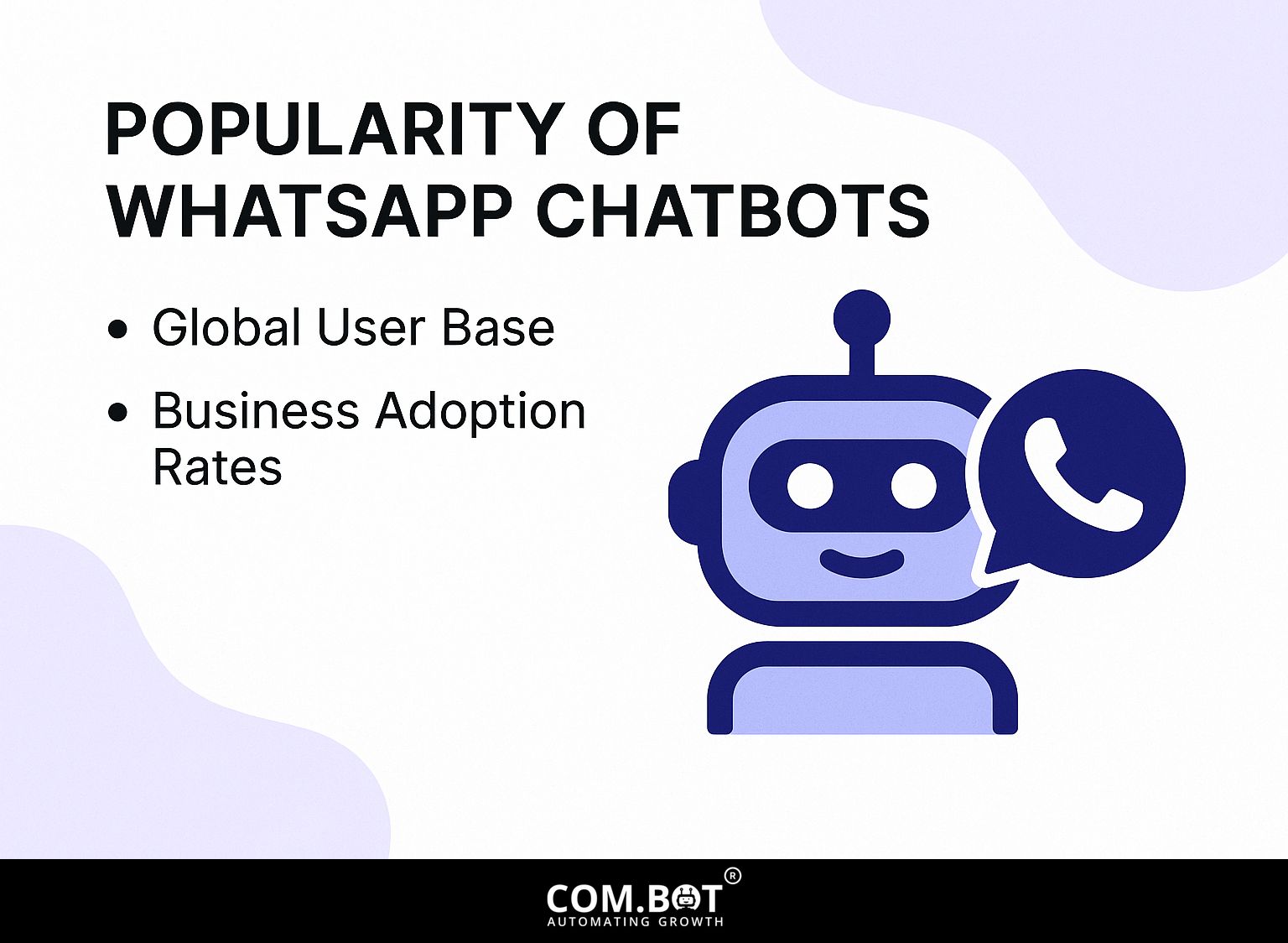
WhatsApp has more than 2 billion users globally, making it a perfect platform for businesses to use AI chatbots to better engage with customers. For an extensive analysis of how businesses can leverage WhatsApp’s capabilities, our comprehensive study on WhatsApp Cloud API offers insights into its benefits and implementation.
1. Global User Base
With users in more than 180 countries, WhatsApp’s messaging platform provides extensive worldwide access for using chatbots. This expansive user base includes varied demographics, with significant penetration in regions such as Latin America, where WhatsApp is frequently the primary communication app.
For businesses, this trend presents opportunities to engage with diverse markets. Using regional content in marketing plans can improve the connection with customers.
Using tools such as Twilio for WhatsApp messaging lets businesses set up automatic replies based on how users engage. Using chatbots with CRM systems helps create unique user experiences, which is important for building loyalty in various cultures.
2. Business Adoption Rates
Recent surveys indicate that 75% of businesses have adopted WhatsApp Business for customer interactions, showcasing a trend towards messaging platforms for lead generation.
Businesses use WhatsApp to make customer service better by answering questions quickly, providing simple order tracking, and sending updates with automatic messages.
Brands like Adidas connect with customers through customized promotions, and airlines like KLM use it to send flight updates.
Tools such as WhatsApp Business API facilitate these interactions, allowing businesses to manage large volumes of messages effectively. As mentioned, these tools are integral to creating streamlined customer service experiences, a concept further explored in our insights on WhatsApp Chatbots: Lead Generation Strategies and Workflow.
By adding chatbots, companies can make response times faster, giving customers quick information without overwhelming employees.
How WhatsApp AI Chatbots Work

WhatsApp AI chatbots use natural language processing (NLP) and machine learning systems to understand and respond to user questions quickly. Those curious about implementing these systems might appreciate our step-by-step guide to creating a WhatsApp AI chatbot.
1. Natural Language Processing (NLP)
NLP helps WhatsApp chatbots comprehend and process user messages, improving the quality of interactions to feel more natural and personal. This technology uses advanced algorithms to analyze text, identify intent, and generate appropriate responses.
When someone types “What are your hours? the chatbot can understand the question and provide the correct business hours.
Programs such as Google’s Dialogflow or Microsoft’s Bot Framework can greatly improve these features. These platforms let developers set up chatbots to answer particular questions, creating more customized and helpful interactions for users. This increases how happy and interested users are with the chatbot.
2. Machine Learning Algorithms
Through machine learning algorithms, WhatsApp chatbots learn from interactions, continuously improving their responses and accuracy over time. These algorithms analyze user inputs to identify patterns and preferences, allowing chatbots to tailor conversations.
For example, if a user often asks about store hours, the bot might show this information first in later conversations. You can use tools like TensorFlow to teach models using past chat data, improving the bot’s grasp of context and intent. Over time, the chatbot answers faster and more correctly, making users more satisfied and engaged.
Benefits of Using WhatsApp AI Chatbots
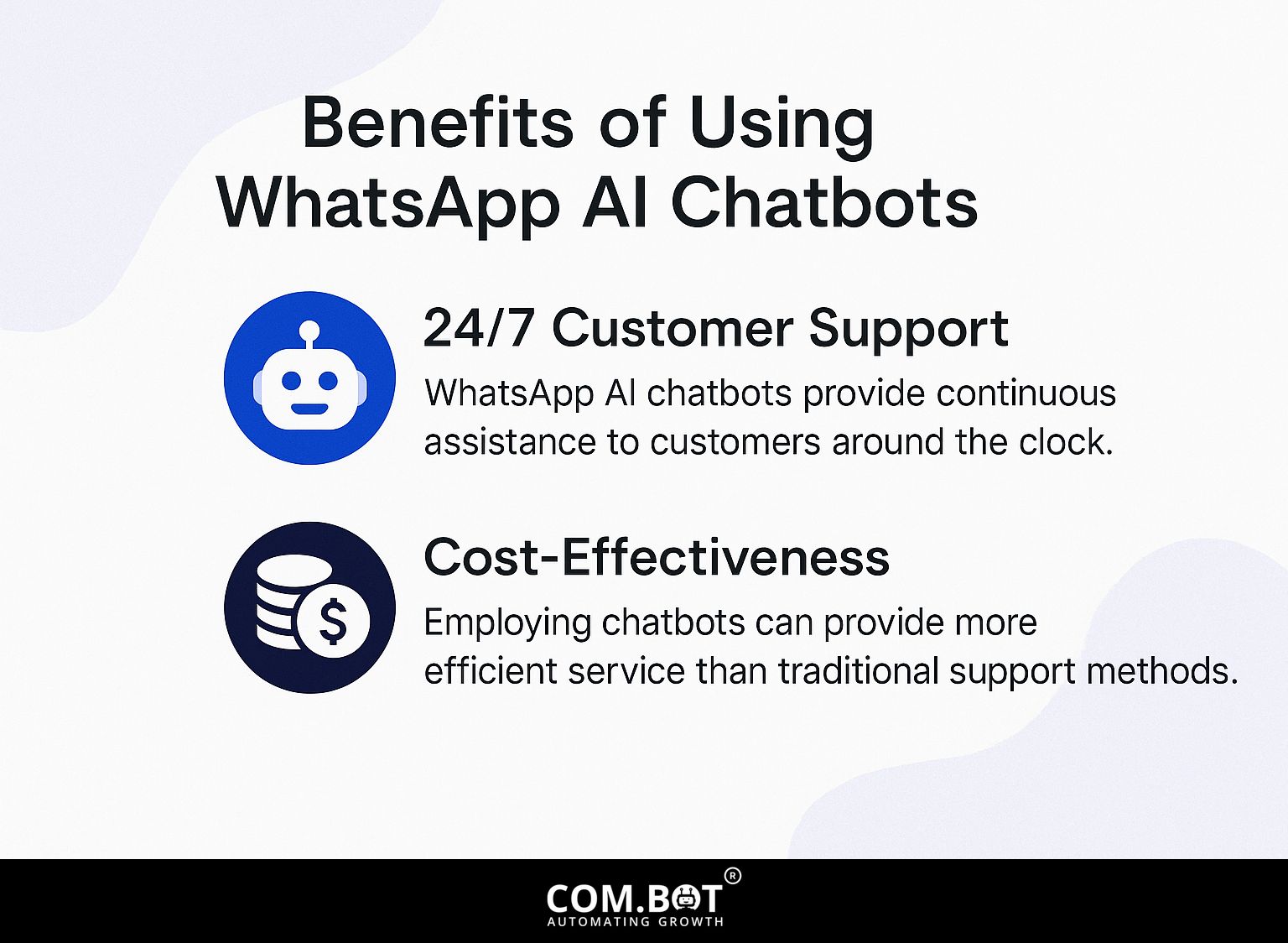
AI chatbots on WhatsApp improve customer support by being available 24/7 and reducing costs compared to traditional methods.
1. 24/7 Customer Support
WhatsApp chatbots provide 24/7 customer support, ensuring users receive timely responses without the need for human intervention. These AI-driven chatbots can handle multiple inquiries simultaneously, typically responding in under five seconds.
For example, a retail business using a WhatsApp chatbot can handle order status questions automatically, shortening response times and increasing customer satisfaction ratings by up to 30%.
Connecting with CRM tools like HubSpot or Salesforce lets chatbots access customer information for more individual interactions. Businesses can use platforms like Twilio or Chatfuel, which have templates to simplify the setup process.
2. Cost-Effectiveness
Using WhatsApp AI chatbots can lower business costs by up to 30%, providing an affordable option for companies.
For instance, a retail business using a WhatsApp chatbot for customer inquiries reported an 80% decrease in staffing needs during peak hours. By automating responses to FAQs and order statuses, they saved thousands monthly.
Similarly, a travel agency integrated a chatbot to manage booking queries, which slashed operational costs by 25% by reducing call center expenses.
Tools like Twilio for linking APIs and Chatfuel for creating bots make setup easy, enabling businesses to fully benefit from these savings.
Challenges and Limitations
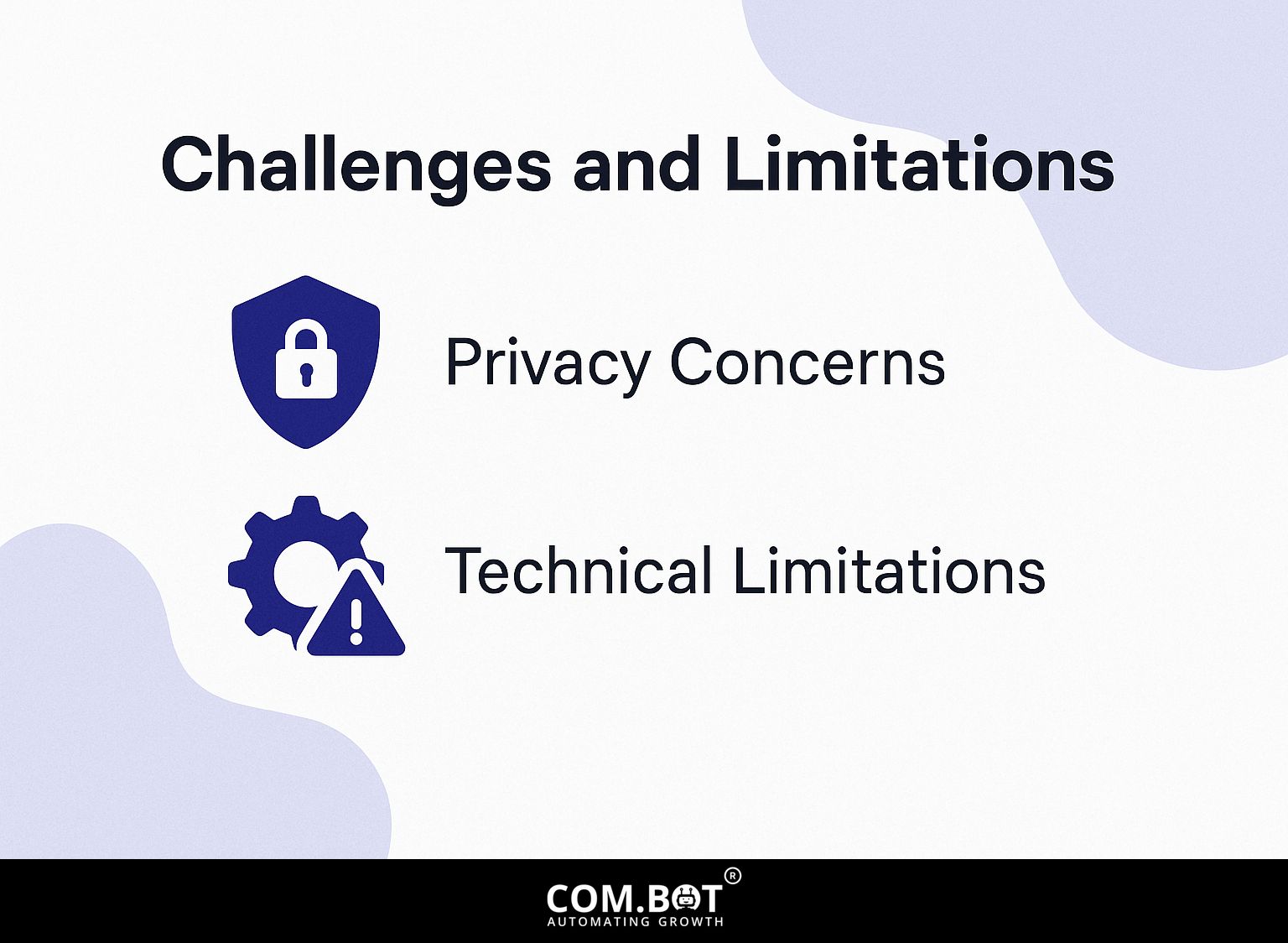
WhatsApp AI chatbots have advantages, but they also have problems like privacy issues and technical barriers that can reduce their usefulness.
1. Privacy Concerns
People are concerned about privacy because they fear chatbots gather and use their personal data. WhatsApp chatbots often collect user data for personalized communication, leading to worries about user consent and transparency. For instance, chatbots may collect messages, phone numbers, and even location data.
To mitigate these concerns, businesses should implement clear data-handling practices, such as informing users about what data is collected and its intended use. Using tools like GDPR compliance checklists can help earn user trust by ensuring privacy rules are followed. Letting users choose not to share data builds trust and privacy.
2. Technical Limitations
Technical limitations such as language processing errors can affect the performance of WhatsApp AI chatbots. These mistakes could cause confusion or incorrect assumptions about what users want.
For instance, a user may ask, “What’s the weather tomorrow?” but the chatbot might respond with details about last week’s forecast instead.
Chatbots can struggle with idiomatic expressions and regional dialects, resulting in inadequate responses. Using tools like Google Dialogflow can help systems process human language, but these tools often have trouble grasping the whole context.
It’s important to frequently train the chatbot with data from user interactions to address these problems and improve the user experience.
Future Trends in WhatsApp AI Chatbots
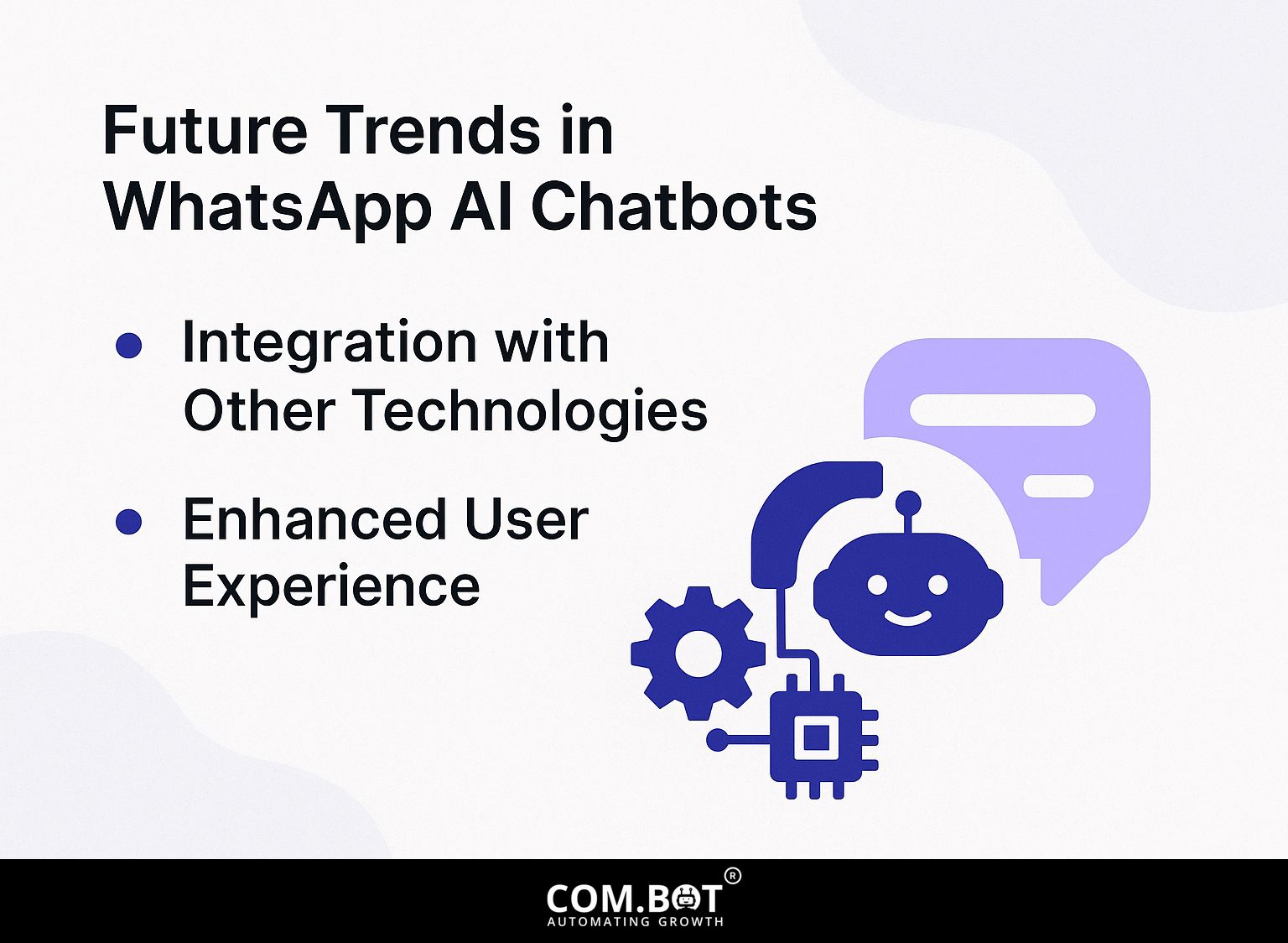
WhatsApp AI chatbots will soon include more features and work better with new technologies, improving the way users interact with them.
1. Integration with Other Technologies
Connecting WhatsApp AI chatbots with other digital tools can improve their features and usefulness in different business tasks.
For example, connecting WhatsApp chatbots to Salesforce can collect customer information during chats, simplifying CRM tasks.
You can set up the integration using tools like Zapier, which allows you to trigger actions in Salesforce based on user interactions in WhatsApp.
Alternatively, linking a chatbot with Notion can facilitate real-time project updates by allowing team members to input data directly through chat. This differs significantly from traditional contact center operations, which often rely on manual updates and can be less efficient.
Improved collaboration makes communication clearer and helps with managing tasks more effectively, resulting in a smoother and quicker workflow.
2. Enhanced User Experience
Enhancing user experience through personalization and improved interactions will be a key focus for WhatsApp AI chatbots moving forward. Sephora and Netflix have successfully used customized chatbots to provide interesting interactions for users.
For example, Sephora employs a chatbot on Facebook Messenger that suggests beauty products based on user preferences, using information from previous conversations. Meanwhile, Netflix uses AI to suggest shows to viewers based on what they have watched before.
As these technologies develop, businesses in various industries can use machine learning to study user data. This can lead to more intuitive interactions that predict what customers want, improving satisfaction and loyalty.
Frequently Asked Questions
1. What are WhatsApp AI chatbots and how do they work?
WhatsApp AI chatbots are computer programs designed to communicate with users through the messaging platform, WhatsApp. These chatbots use artificial intelligence to understand and respond to user messages, providing helpful and relevant information as if chatting with a real person. They work by using Natural Language Processing (NLP) and Machine Learning algorithms to interpret and generate responses based on user input.
2. Why are WhatsApp AI chatbots becoming popular?
The popularity of WhatsApp AI chatbots is due to their ability to provide quick and efficient responses to user inquiries, without the need for human intervention. This technology is cost-effective for businesses, as chatbots can handle a large volume of inquiries simultaneously, freeing up human resources for other tasks. Chatbots are accessible all day and night, which helps customer service and increases satisfaction.
3. What types of tasks can WhatsApp AI chatbots perform?
WhatsApp AI chatbots can perform various tasks, such as answering frequently asked questions, providing product information and recommendations, processing orders, and scheduling appointments. They can help with customer service questions, give technical support, and handle personal tasks like setting alerts and sending messages.
4. Do WhatsApp AI chatbots have limitations?
As with any technology, WhatsApp AI chatbots have limitations. They may not be able to handle complex or sensitive inquiries that require a human touch. Chatbots can only reply using the programming and data they have, so they might not get slang or casual language. But as AI develops, these issues are constantly being solved and made better.
5. Can I create my own WhatsApp AI chatbot?
Yes, you can create your own WhatsApp AI chatbot using various platforms and tools available online. These platforms provide templates, drag and drop features, and customizable options to build a chatbot that fits your specific needs. There are tutorials and resources to guide you in building and refining your chatbot as time goes on.
6. Are WhatsApp AI chatbots safe to use?
Yes, WhatsApp AI chatbots are safe to use as they are built and managed by reputable companies and developers. However, it is important to make sure that any personal or sensitive information given to a chatbot is safe and secure. It is also recommended to use chatbots from trusted sources and to be cautious of any potential scams or malicious bots.
